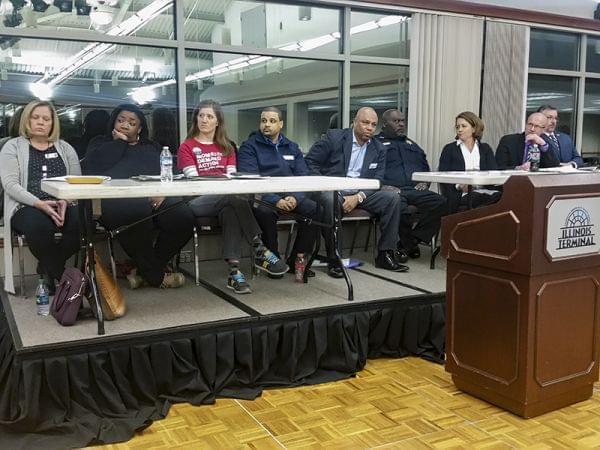Town Hall Panelists Brainstorm Ways To Curb Gun Violence in Champaign-Urbana

Panelists at a town hall meeting on gun violence, organized by the Champaign Unit 4 PTA Council, at the Illinois Terminal on Wednesday January 17.
Gun violence and how to stop it was the focus of a town hall meeting held Wednesday in response to the shooting outside Champaign Central High School in early December.
The Wednesday meeting at downtown Champaign’s Illinois Terminal building was organized by Champaign Unit 4 Schools PTA Council president Sheri Williamson. She said she convened the panel of nine experts — from law enforcement, education, gun control advocacy and anti-violence backgrounds — to brainstorm solutions to the issue along with community members.
Williamson opened up the meeting by asking the panelists what factors they think lead to gun violence in the Champaign-Urbana community.
The problem is much broader than the C-U community, according to panelist Michael Schlosser, director of the Police Training Institute at the University of Illinois at Urbana-Champaign. Schlosser said that gun violence is a pervasive problem across the country, and at its root is social inequity.
“This a problem involving equity and poverty and race. You cannot talk about poverty without talking about race,” said Schlosser. “We really need to try to improve the quality of life of everyone regardless of their socioeconomic status.”
Schlosser said that means increased opportunities for low-income children, teens and adults.
Panelist and local activist Nicole Anderson-Cobb said when it comes to the causes of violence, the discussion should also include masculinity and power.
“Far too often our young men of all races believe that the only way they can access power is to be armed,” said Anderson-Cobb.
To help prevent gun violence, Cobb says she hopes more organizations, including philanthropic, civic and faith-based agencies, start helping young men empower themselves without the need to pick up a weapon.
Another panelist, Champaign Community Relations Manager Tracy Parsons, cited the local organization DREAAM House (Driven to Reach Excellence & Academic Achievement for Males), a college-to-prison program focused on at-risk African-American young men. Parson says it’s hard for black male youth to navigate the myriad different messages they receive about how to respond to conflict and “we have to help them with the tools and resources to navigate these situations.”
When asked what obstacles police face when trying to investigate gun crimes, Champaign Police Chief Anthony Cobb, said officers struggle to recreate what happened at the scene of a shooting, when witnesses leave or refuse to speak to police about the incident.
“When you get to the scene and the only person you have is the victim and the victim is unconscious, we are starting at subzero, not zero, subzero,” said Cobb, who also sat on the panel.
Cobb also tasked parents with doing more to find out what their kids are doing and who they’re hanging out with.
“Are you having conversations with children about safety, who they’re interacting with on social media?” he asked. “There are a lot of things we can do as a community to get in front of these things.”
Cobb says the number of shootings in Champaign have actually decreased, from 110 in 2015 down to 85 in 2017. He cited a program called CU Fresh Start — first implemented in 2016 — which offers offenders with a history of gun-related offenses a chance to change gain access to community resources and services to help them change their behavior.
“We’re headed in the right direction, but we still got a lot of work to do,” Cobb said.
Another panelist, Champaign County States Attorney Julia Rietz, said the problem is not something that’s solely up to law enforcement to solve. She challenged attendees to do more to support the families of perpetrators and victims, to provide job opportunities to ex-offenders and to help prevent violence from happening in the first place.
“If law enforcement doesn’t have to come in and I don’t have to stand up to ask to send someone to prison because we are able to come up with some way to stop this, then that is something to be celebrated,” said Rietz.
About 100 people attended the panel discussion. Williamson and others on the panel said they hoped that the discussion inspire further community collaboration aimed at reducing gun violence in Champaign.
